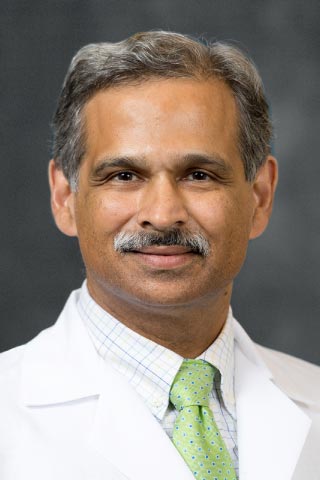Stories
World Lung Cancer Day
Featuring Shirish Gadgeel, MD
Q: What motivated the focus of your professional efforts on treating lung cancer?
A: Two primary experiences led to my decision 20 years ago. During my residency, the first oncologist I had a close relationship with specialized in lung cancer, and he worked both in the lab and the clinic. I found it fascinating that someone could see patients in the clinic and then advance a project in lab that would improve the outcomes of those patients. This doctor is still a mentor of mine to this day. Second, though the outcomes of lung cancer patients in the 1990’s weren’t great, the oncology teams still took really great care of their patients. Teams weren’t deterred by the reality that there were few tools available to help shrink patients’ tumors at the time, rather they focused on helping patients manage symptoms and address the psychological impact of lung cancer.
Q: Is there a specific piece of knowledge it is critical for patients to know who have been newly diagnosed with lung cancer?
A: The most critical aspect is that there is not just one type of lung cancer, and patients benefit from understanding the characteristics specific to their diagnosis. There is a wealth of information about lung cancer available from a patient’s oncologist as well as additional resources available on the internet to supplement these discussions.
Q: What advice would you give to counsel physicians who are caring for these newly diagnosed patients?
A: Building on the previous answer, it is important for oncologists to take the lead on educating their newly diagnosed patients on their specific type of lung cancer and then go a step further to have conversations that connect the dots between the type of lung cancer and the rationale for the prescribed treatment. These conversations can ensure a patient is able to spend time reading research and treatment procedures that are specific to their lung cancer. Additionally, when patients who understand the rationale behind their first-, second-, third-line treatment plans can better prepare for those experiences and outcomes.
Q: You’ve been on the cutting edge of clinical research for some time now. Are there any emerging topics that hold particular interest?
A: There are many exciting areas of research and emerging conversations in lung cancer, and my interest is currently captivated by the diversity in clinical trial conversations, particularly in light of the highly diverse population here in Detroit. The clinical research enterprise has become burdensome for all parties involved – sponsors, contract research organizations, institutions and most important patients. This creates challenges to enroll diverse patient populations in clinical trials. These enrollment challenges can result in a lack of diversity in trials, which may limit the applicability of resulting data because there isn’t sufficient evidence on the impact of new treatments within disparate populations. Many thought leaders from institutions and industry are making headway to address these challenges from their respective organizations, and I look forward to seeing this dynamic evolve with time.


